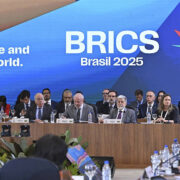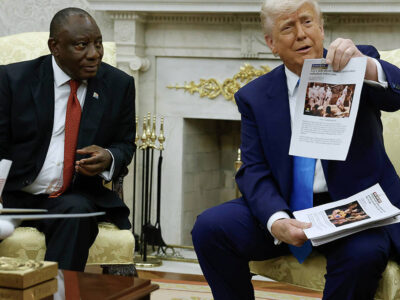
What is your title at Hogan Lovells?
I am a partner in the corporate and commercial Mergers and Acquisitions (M&A) department.
And your company is active across Africa?
We are active across Africa but we’re a global firm, with activity in about 40 countries. We have coverage all over and we can advise on a range of issues, depending on where our clients are. We have done transactions in multiple jurisdictions across Africa.
 Deepa Vallabh, partner at Hogan Lovells.
Deepa Vallabh, partner at Hogan Lovells.
And you are able to point out subtle differences in the law in different jurisdictions?
We are there to help companies navigate those differences.
Are you advising private-equity investors on their approach to investments in mining companies?
There is a significant amount of private-equity investment in mining. The natural tension between investments from private-equity companies and how mining companies operate relates to when there will be possible returns on the project. Private companies typically will have a mandate to be able to exit the asset in five to seven years but private-equity money in mining companies needs to take a longer-term view.
It also depends on how mature the mining asset is. There is no one-size-fits-all strategy for private-equity investment in mining companies. It is very rare for a private-equity player to come in at a greenfield stage because you don’t employ private-equity capital in something that may never materialise. There is less concentration in that type of investment.
Generally, it would be private-equity capital in a mine that has been developed; it has been operating; it has shown strong and steady returns; it has strong ore potential; it has life of mine for a long time.
Those are the important considerations for a private-equity investment model because it will depend on when they can exit and what return they can exit at.
So the equation is different for private equity?
It is more complex. Not that it doesn’t happen but it’s a different consideration when you’re investing in a mining company as opposed to any other sector. Mining investments can take a longer horizon to give you an overall return in terms of what you’re expecting as a private-equity player versus other sectors. That’s because there are lots of uncertainties.
So a private-equity investor might demand dividends and the mine management might want to reinvest in fixing shafts?
Correct. Mining companies by their very nature can be very capital intensive so you have to take that into account versus it being cash flush to provide regular dividends.
The other challenge with mining companies is that commodity prices are cyclical and there are world dynamics that play into commodity pricing. There’s always an up and down cycle and you can’t really predict that or control that.
But more broadly you can predict that green metals or critical metals are going to become the new thing. Is private equity going to be chasing investments in those sectors?
There is a lot of interest in private equity putting money into mines that have the potential to service the green metals and green energy sectors because they are lucrative. Having said that, there are a few things that must be mentioned in relation to this. You have to take a long-term view. We are starting to see a slowdown on the need for some of the material in relation to electric vehicles, for example.
 Credit: Ivanhoe Mines
Credit: Ivanhoe Mines
There has been significant demand for off-take arrangements that have been put in place over the last four or five years when it was really in demand but now there is stability in that supply. That naturally drives demand down. You have to ensure that if you are putting capital in a new thing that there is still a significant demand for that metal and that you don’t have all of the players who need that metal having already sorted out their supply arrangements.
Are you being asked to advise on green metals?
On things like that, yes. For the off-take arrangements that we look into, we look at the considerations around the relationship between the off-taker and the mine which is producing the metals. We also look at the downstream, which is somebody who has procured the resource and is then providing it to an electric vehicle manufacturer, for example.
There are intricacies around those relationships. Those are also commercial agreements that have various commercial considerations that you need to take into account and it can be very complex in terms of how they are negotiated.
We know that the big institutional players have a lot of patience, but are there also private-equity investors who sometimes have longer horizons?
It depends on how old the fund is and what priorities they are looking at. There are a number of private-equity funds that specifically are targeting investment in Africa that take a long-term view.
Those private-equity firms have learned over the years, even if it is not an investment in the mining sector but it is in another sector, that their return periods are longer and perhaps the rate of return is not the same but it could be a lot more lucrative in the long run than more stable sectors. You have to be able to ride the wave in terms of a longer investment cycle. There are a lot of funds out there that have the appetite and the capital to do that.
Is advising on legal issues for cross-border mergers and acquisitions something that Hogan Lovells specialises in?
That’s the core portion of what I do. When you’re doing a mergers and acquisition transaction, it may traverse different jurisdictions. When there are multi-jurisdictional aspects, you have to ensure that you’re looking at multiple regulatory regimes across different sectors.
 Thika Law Courts forms part of the Kenyan judicial system. Aligning the continent’s legal practices will help trade.
Thika Law Courts forms part of the Kenyan judicial system. Aligning the continent’s legal practices will help trade.
Do you think that there’s any prospect in the medium term of AfCFTA making a difference, making it easier to do business across borders?
Absolutely. The legislation has been in place for some time, it came into effect a number of years ago. But you had countries that needed to actually sign up to. Recently we’ve seen President Ramaphosa’s announcements and sentiments to support the agreement and with us being one of the important economies on this continent, the support by our government is key. To actually materialise the benefits of that agreement for other African states is key to unlocking the value that the agreement is intended to unlock.
Intra-African trade between African nations compared to comparative figures for Europe and Asia is at a much lower level. Yet we have a wealth of resources on this continent, and skills and knowledge.
Would you welcome some sort of a flattening out of the legal framework across the continent?
Absolutely yes, to assist future Africa trade.
Would the Secretariat of the AU be involved?
The African Union has been promoting the agreement. The true test of whether that agreement actually works across the continent is going to come from the commitments of the various governments to actually apply the principles and the intent and the spirit behind it.
What that means is that you’ve got to get some regulatory certainty across jurisdictions which is not easy. We are not one Africa: we have different languages, we have different pasts, we have different reasons for why certain legislation exists.
But at least there is a SADC and the other regional blocks.
There are regional blocks but some of the success of this agreement is going to depend on us being able to navigate some of those differences in legislation between ourselves. The success of it is going to depend on being able to create mechanisms for dispute resolution between different states. Then it’s the commitment to make it work, which might come at a cost to your own fiscus.
Does that mean you can’t have campaigns to Buy Local?
Exactly. It comes down to your allowing goods to come into your country and levying very little import tax. Goods leaving your country would be levied very little export tax. All of these things have a fiscus implication. Where you have the developing needs of a country to weigh that against a lower revenue we’re going to have to have very mature governments to be able to adopt that and embrace that.
And you are not just talking from a strictly legal point of view, you’re talking about trade and the whole scenario.
As a mergers and acquisition lawyer there are the parameters of the legal framework that we follow, but actually what drives a lot of what we do is being able to negotiate and broker commercial arrangements that make sense to both parties.
 Deepa Vallabh
Deepa Vallabh
Biography
Deepa Vallabh has over 22 years’ experience in corporate and commercial practice and has in-depth knowledge in a number of legal areas, including mergers and acquisitions (both domestic and cross-border), capital market transactions, BEE transactions, corporate reorganisations and restructurings with a particular focus on cross-border M&A transactions into Africa.
Deepa has experience in a variety of sectors which includes mining and resources, technology, telecommunications, media and communications, FMCG, insurance, agriculture, manufacturing and private equity.











Comments